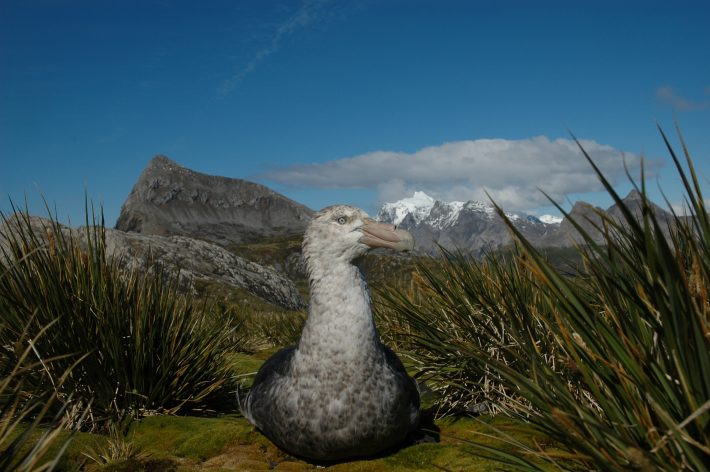Climate change benefits for giant petrels
University of Exeter press release
Giant petrels will be “temporary” winners from the effects of climate change in the Antarctic region – but males and females will benefit in very different ways. This study was published today in the Journal of Animal Ecology.

The study, by experts from the University of Exeter and the British Antarctic Survey (BAS), is one of the first to analyse how different sexes of the same species could be affected by changing conditions through global warming.
The research shows that giant petrels – known colloquially as “stinkers” – will benefit from an increased number of warm weather anomalies in the region, while changes to wind patterns across the Antarctic and the southwest Atlantic will also improve their ability to forage at sea.
However, the research reveals that the benefits are different for the males of the species, compared to the females.
This relates to differences in foraging behaviour, as the males – by far the larger and heavier sex – dominate access to carrion on land and travel shorter distances from the colony when foraging at sea.
It is therefore the females which will benefit more from stronger winds over the ocean, helping them fly and forage at sea with less effort, and from retreating sea ice, extending the area of open waters suitable for foraging.
Crucially, however, the study also suggests that any increase in longline fishing (and resulting mortality on fishing gear – termed bycatch) could harm their survival.
Few studies have examined how different sexes of the same species could be affected by changing conditions, and the researchers say this means that impacts of climate change may be underestimated.
Lead author Dr Dimas Gianuca, of the University of Exeter and BAS, said:
“It is really difficult – but really important – to measure how each sex will respond to environmental changes, especially in species with strong sexual size dimorphism, like the giant petrels.”
“Giant petrels are going to do relatively well, based on our understanding of the expected changes in this region. The increased winds and other changes in the environment will be good for them.”
“However, any future increase in longline fishing – which may well result in a greater risk of bycatch – is likely to impair the survival of females, which forage further north than males and, consequently interact more with poorly managed fisheries in subtropical waters”, he added.
The study analysed 15 years of monitoring data on giant petrel survival and breeding collected by British Antarctic Survey at Bird Island, South Georgia, and projected the likely consequences of future environmental change and fishing.
Though petrels appear to be climate change “winners” in the coming decades, the researchers warn this could be temporary.
Dr Richard Sherley, of the University of Exeter, said:“Although warm conditions may benefit giant petrels, in the long term, persistent warm anomalies can lead to broader ecosystem disruptions in Antarctic food webs, and potentially further reduction in krill stocks.”
“This would lead to further population declines at South Georgia of Antarctic fur seals and other species on which male giant petrels depend for food during the breeding season, therefore it will be bad for petrels too”, he added.
Dimas Gianuca’s PhD scholarship was funded by a Brazilian government scheme called Science Without Borders. Funding for the long-term monitoring came from the Natural Environment Research Council (NERC).
Read full study (free to read for a limited time):
Gianuca, D, Votier, S, Pardo, D, Wood, A, Sherley, R, Ireland, L, Choquet, R, Pradel, R, Townley, S, Forcada, J, Tuck, G, Phillips, R. Sex-specific effects of fisheries and climate on the demography of sexually dimorphic seabirds. J Animal Ecology 2019. DOI: 10.1111/1365-2656.13009
Media contacts:
University of Exeter, Email:pressoffice@exeter.ac.uk, Tel: +44 (0) 1392 724 828
Like what we stand for?
Support our mission and help develop the next generation of ecologists by donating to the British Ecological Society.